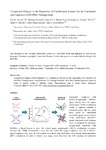Unexpected Changes in the Population of Coordination Isomers for the Lanthanide Ion Complexes of DOTMA–Tetraglycinate

Use este enlace para citar
http://hdl.handle.net/2183/18348Coleccións
- Investigación (FCIE) [1231]
Metadatos
Mostrar o rexistro completo do ítemTítulo
Unexpected Changes in the Population of Coordination Isomers for the Lanthanide Ion Complexes of DOTMA–TetraglycinateAutor(es)
Data
2016-09-19Cita bibliográfica
Unexpected Changes in the Population of Coordination Isomers for the Lanthanide Ion Complexes of DOTMA–Tetraglycinate. Cemile Kumas, W. Shirangi Fernando, Piyu Zhao, Martín Regueiro-Figueroa, Garry E. Kiefer, André F. Martins, Carlos Platas-Iglesias, and A. Dean Sherry. Inorganic Chemistry 2016 55 (18), 9297-9305. DOI: 10.1021/acs.inorgchem.6b01390
Resumo
[Abstract] Lanthanide complexes with DOTA–tetraglycinate (DOTA-(gly)4) heavily favor the square antiprismatic (SAP) coordination isomer in aqueous solution, a structural feature that has made them useful as water-based paraCEST agents. In an effort to create amide-based paraCEST agents with rapid water exchange rates, we prepared the analogous tetraglycinate complexes with DOTMA, a ligand known to favor the twisted square antiprismatic (TSAP) coordination structures. Unexpectedly, NMR investigations show that the LnDOTMA–(gly)4 complexes, like the LnDOTA–(gly)4 complexes, also favor the SAP isomers in solution. This observation led to density functional theory (DFT) calculations in order to identify the energy terms that favor the SAP structures in lanthanide
complexes formed with macrocyclic DOTA– and DOTMA–tetraamide ligands. The DFT calculations revealed that, regardless the nature of the ligand, the TSAP isomers present more negative hydration energies than the SAP counterparts. The extent to which the TSAP isomer is stabilized varies, however, depending on the ligand structure, resulting in different isomeric populations in solution.
Palabras chave
Contrast agents
Coordination compounds
Gadolinium
Lanthanides
NMR imaging
Coordination compounds
Gadolinium
Lanthanides
NMR imaging
Versión do editor
Dereitos
This document is the Accepted Manuscript version of a Published Work that appeared in final form in "Inorganic Chemistry", copyright © American Chemical Society after peer review and technical editing by the publisher.
ISSN
0020-1669
1520-510X
1520-510X





